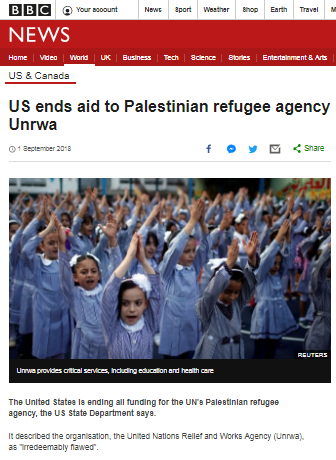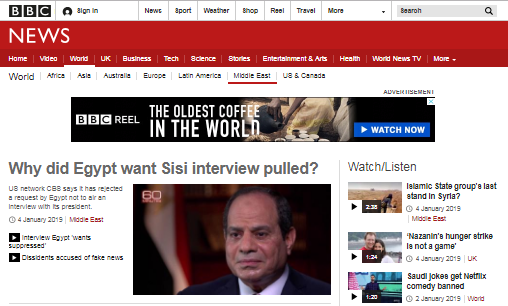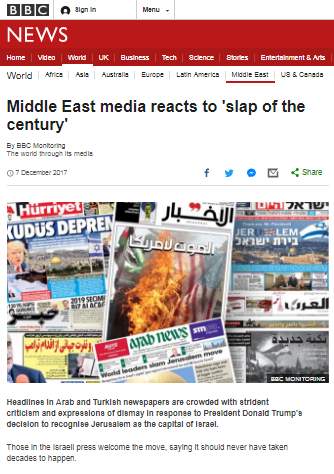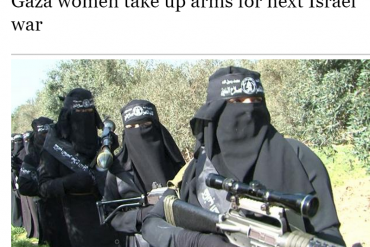Earlier this year BBC audiences saw quite a lot of reporting on the topic of US aid donations to the Palestinians in general and via UNRWA in particular – for example:
BBC WS listeners get a homogeneous view of US aid to Palestinians – part one
BBC WS listeners get a homogeneous view of US aid to Palestinians – part two
BBC News report on UNRWA funding story omits relevant background
BBC WS Newsday coverage of UNRWA aid story – part one
BBC WS Newsday coverage of UNRWA aid story – part two
Falsehoods go uncontested on BBC World Service – part one
Falsehoods go uncontested on BBC World Service – part two
Three BBC articles on US aid promote an irrelevant false comparison
BBC’s Yolande Knell amplifies UNRWA’s PR campaign
BBC WS facilitates UNRWA PR yet again – part one
BBC WS facilitates UNRWA PR yet again – part two
Unbalanced promotion of UNRWA PR on BBC World Service radio
That generous, if mostly imbalanced, coverage was hallmarked by the repeated failure to provide BBC audiences with information concerning the multiple issues that have made UNRWA so controversial or any in-depth examination of the agency’s purpose, its record or its efficiency. Significantly, BBC audiences were not provided with an explanation of why – in contrast to the UN agency which takes care of all other refugees – UNRWA does not have an active program for “local integration” of refugees where they now reside – even if they live in Palestinian controlled areas – or “resettlement” in third countries.
Those crucial omissions were evident again in a report originally published on the BBC News website’s main homepage as well as its ‘World’, ‘US and Canada’ and ‘Middle East’ pages on August 31st under the headline “US ends aid to Palestinian refugee agency Unrwa“.
The article opened with a three sentence description of the story:
“The United States is ending all funding for the UN’s Palestinian refugee agency, the US State Department says.
It described the organisation, the United Nations Relief and Works Agency (Unrwa), as “irredeemably flawed”.
The US administration has “carefully reviewed” the issue and “will not make additional contributions to Unrwa,” spokeswoman Heather Nauert said.”
Readers then found three paragraphs of Palestinian Authority condemnation of the decision followed by two paragraphs and a screenshot amplifying comment from UNRWA’s spokesperson.
“A spokesman for Palestinian President Mahmoud Abbas later said the move was an “assault” against his people.
“Such a punishment will not succeed to change the fact that the United States no longer has a role in the region and that it is not a part of the solution,” Nabil Abu Rudeina told Reuters news agency.
He added that the decision was “a defiance of UN resolutions”.
A spokesman for Unrwa, Chris Gunness, defended the agency in a series of tweets.
“We reject in the strongest possible terms the criticism that Unrwa’s schools, health centres, and emergency assistance programs are ‘irredeemably flawed’,” he wrote.”
The report continued under the sub-heading “What is Unrwa?”.
“Unrwa was originally set up to take care of hundreds of thousands of Palestinians displaced by the 1948 Arab-Israeli war.
The agency says it currently supports more than five million Palestinians in Gaza, the West Bank, Jordan, Syria and Lebanon, including providing health care, education and social services.”
The BBC’s article went on to supposedly explain the background to the US decision under the sub-heading “Why is the US critical of Unrwa?”.
“The US disagrees with Unrwa, and Palestinian officials, on a number of issues. […]
The US and Israel also disagree with Unrwa on which Palestinians are refugees with a right to return to the homes they fled following the 1948 war.
Nikki Haley, the US ambassador to the UN, said earlier this week that Unrwa exaggerated the number of Palestinian refugees, and needed to reform.
“You’re looking at the fact that, yes, there’s an endless number of refugees that continue to get assistance, but more importantly, the Palestinians continue to bash America,” she said.
The state department says the US is contributing a “very disproportionate share of the burden of Unrwa’s costs”.
It complains of a business model and fiscal practices, linked to an “exponentially expanding community of entitled beneficiaries”, which is “unsustainable and has been in crisis mode for many years”.”
Interestingly, the BBC chose not to report that the US State Department statement also included the following:
“We are very mindful of and deeply concerned regarding the impact upon innocent Palestinians, especially school children, of the failure of UNRWA and key members of the regional and international donor community to reform and reset the UNRWA way of doing business. These children are part of the future of the Middle East. Palestinians, wherever they live, deserve better than an endlessly crisis-driven service provision model. They deserve to be able to plan for the future.
Accordingly, the United States will intensify dialogue with the United Nations, host governments, and international stakeholders about new models and new approaches, which may include direct bilateral assistance from the United States and other partners, that can provide today’s Palestinian children with a more durable and dependable path towards a brighter tomorrow.”
Once again BBC audiences did not see an explanation of the changes to UNRWA’s mission over the years which have created the situation in which the number of people registered as refugees has grown rather than diminished in 70 years.
“In 1950, its first director told the General Assembly that the “agency has decided that a refugee is a needy person, who, as a result of the war in Palestine, has lost his home and his means of livelihood.” His definition made no reference to descendants.
Not until 1965, fifteen years after its creation, did an UNRWA commissioner-general decide, against objections from the United States government, to create “an extension of eligibility, subject to need, to the third generation of refugees (that is, to children of persons who were themselves born after 14 May 1948).” […]
In 1982, or thirty-two years after its creation, UNRWA took another step forward by extending eligibility to all generations of descendants. It did so by obtaining a General Assembly resolution instructing UNRWA “to issue identification cards to all Palestine refugees and their descendants” without any limitation on how many generations of descendancy this practice would continue. […]
UNRWA went still further in 1992 by adding a provision that those descendants of Palestine refugee males who “are eligible to register for UNRWA services” and are registered with UNRWA, should be “referred to as Registered Refugees or as Registered Palestine Refugees though they do not meet UNRWA’s own standard of having lived in Palestine prior to May 1948.””
Neither did readers get any information concerning the relevant topic of the Arab League’s politically motivated refusal to integrate Palestinian refugees in countries such as Lebanon, Syria and Egypt or the UN’s abandonment of that target.
“In November 1951, UNRWA’s second director, John Blandford, Jr., proposed a three-year, $200 million program to reintegrate 150,000-200,000 refugees into their Arab host countries. Blandford’s plan was endorsed by U.N. General Assembly resolution 513 of January 26, 1952, which tasked UNRWA “to explore with the governments … their assuming administration of reintegration projects at the earliest possible date.” Seven years later, the concept was reaffirmed by U.N. secretary-general Dag Hammarskjöld, who called for the “reintegration” of refugees “into the economic life of the area.”
For its part, Washington was a foremost advocate of the reintegration program as evidenced by various State Department plans and proposals, including those in May 1949, May 1953, July 1957, March 1959, and June 1960. To this must be added the 1954 Anglo-American Alpha Plan, a plan proposed by Secretary of State John Foster Dulles as well as a bold initiative by Secretary of State Christian Herter and approved by President Dwight Eisenhower in June 1960.
But since 1960, successive administrations have ignored or forgotten the reintegration idea, and U.S. allocations of funds to UNRWA have been devoted to maintaining the few surviving refugees and their much more numerous descendents in unsettled conditions, turning them into a growing source of conflict. […]
And so UNRWA abandoned its original mission of relief extension and conflict resolution, evolving into an agency for the perpetuation of unsettled claims against Jerusalem for millions of persons born in the years after the founding of Israel in 1948.”
Likewise, the BBC did not attempt to explain to its audiences why some 2 million people who hold Jordanian citizenship are still defined as ‘refugees’ by UNRWA or why a similar number of people who live in areas under the control of either the Palestinian Authority or Hamas also continue to hold that status.
Readers of this report did however see a further six paragraphs of Palestinian messaging under the sub-heading “What does the Palestinian side say?” including uncritical amplification of statements from a person inaccurately described as “the Palestinian ambassador to Washington”.
“On Friday, the Palestinian ambassador to Washington, Hossam Zomlot, accused the US of “endorsing the most extreme Israeli narrative on all issues including the rights of more than five million Palestinian refugees”.
The US “is damaging not only an already volatile situation but the prospects for future peace”, he told AFP.”
With the BBC once again having failed to provide its audiences with the full range of information necessary for understanding of this story, readers would of course be unable to objectively assess Zomlot’s claims regarding the UN agency’s highly debatable role in contributing to “the prospects for future peace”.
On September 1st that report was replaced by a subsequent one which will be discussed in part two of this post.




